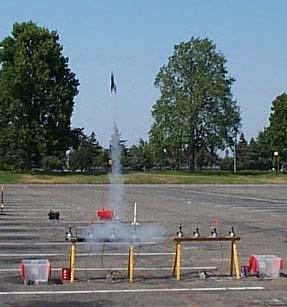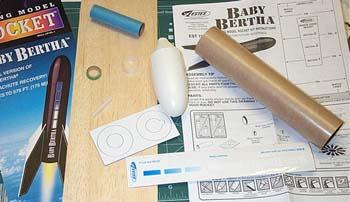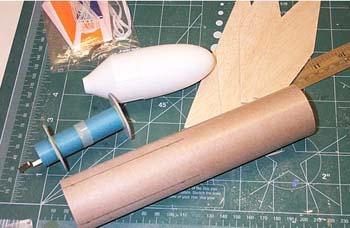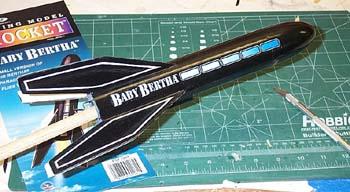| Construction Rating: | starstarstarstarstar_border |
| Flight Rating: | starstarstarstarstar |
| Overall Rating: | starstarstarstarstar |
| Diameter: | 1.64 inches |
| Length: | 12.75 inches |
| Manufacturer: | Estes  |
| Skill Level: | 1 |
| Style: | Sport |
 Brief:
Brief:
The Baby Bertha is a new kit (2002) based on the venerable and popular Big Bertha kit. The rocket has the same large, V2-like fins and blunt, rounded nose cone as the Big B, but is 1/2 the length at 12 inches. Rated at "Level 1", it's an easy to construct kit using traditional, Estes-style methods that would make an excellent kit for a beginner, or young rocketeers.
Construction:
If you have ever built an Estes Alpha or similar kit, the Baby will give you a familiar construction experience without surprises. The motor mount uses an engine clip and motor block to restrain the engine, and two die-cut paper centering rings to position the mount in the body tube. The Baby uses Estes BT-60 body tube which at 1.6 in. diameter is wider than most Estes rockets, so these may be larger centering rings than you are accustomed to. The four balsa fins are relatively large and much easier to align on the tube than the small, light fins on most rockets of this size. Even new builders should have a relatively easy time with these fins.
I used my favorite technique to attach the fins. After roughing up the tube with fine sandpaper I attach each fin with medium CA glue and hold it in the perpendicular position until it sets, which takes only 15 seconds or so. I use very little glue for this step, just enough to hold the fin. Then I apply ample fillets with wood glue. The big fins and big tube on the Baby Bertha makes fin attachment very easy.
The shock cord attaches with the usual three-fold connection to the body tube. As I do on all my rockets, I used a length of Kevlarcord for the booster-side connection and tied that to the elastic shock cord. I attached a twelve in. chute to the cord.
The construction "PROs" for the Baby Bertha have to be the larger size of the components which makes things easier on an inexperienced builder. It's a great 'trainer' for balsa and paper construction techniques. No surprises or special challenges.
 I can't think of any serious construction problems or issues, except the almost standard Estes problem of inadequate shock-cords. The Baby goes together easy.
I can't think of any serious construction problems or issues, except the almost standard Estes problem of inadequate shock-cords. The Baby goes together easy.
Finishing:
I used thinned Elmers Wood Filler on those big slabs of balsa (the fins) and the spiral seam in the tube. I also created fillets for the launch lug. This is a pretty good rockets for learning the wood-filler technique. I wanted to duplicate the black and white paint scheme from the package art (actually, I had other ideas, but the kids wanted the package look). After two coats of grey primer, I taped off facing sides on the fins (the fin patter is tough to describe but obvious when you see the package), and applied two coats of gloss black. Once that dried I removed the masking tape and covered the black areas. This turned out to be tricky as there are several angles where paint could pass through to the black areas. I would recommend painting the white fins sides first, then mask them off and paint the whole rocket black. I also think that there are plenty of alternate paint schemes that would look great on this rocket. Try some V2-style paint schemes, for example.
The kit comes with one long decal which runs along one side. The decal actually reaches past the body tube onto the nosecone. Once the decal was placed I used a hobby knife to cut it along the seam between the nosecone and body.
The white pinstriping in the package art is not provided in the kit. I used white trim tape (get it at the hobby store), and it looks sharp (although mine is not as 'fine' a line as the one on the package). I'm giving some thought to duplicating the line in black on the white fins.
The "PRO" for finishing is the opportunity to experiment a bit with design. This rocket will look good in a variety of schemes, so have some fun with it.
 One possible "CON" would be the large amount of balsa to fill if you want a real smooth finish. I didn't find that an issue, and I think this is a good rocket to practice those techniques. If you're not real concerned about filling all the grain then there is no problem at all. One could also object, I guess, to the relatively difficult "stock" paint scheme. and the single decal. The best thing to do is to ignore the package art and design your own scheme. If I were Estes I'd give the Baby it's own, fun color scheme like the Fat Boy, rather than try to duplicate the current Big Bertha look.
One possible "CON" would be the large amount of balsa to fill if you want a real smooth finish. I didn't find that an issue, and I think this is a good rocket to practice those techniques. If you're not real concerned about filling all the grain then there is no problem at all. One could also object, I guess, to the relatively difficult "stock" paint scheme. and the single decal. The best thing to do is to ignore the package art and design your own scheme. If I were Estes I'd give the Baby it's own, fun color scheme like the Fat Boy, rather than try to duplicate the current Big Bertha look.
I'm rating it at 4 1/2, taking off a half point for the shock-cord.
Construction Rating: 4 out of 5
Flight:
We have one flight on the Baby. We used a B6-4 to launch it in light to medium winds. The boost was straight, fast and to a greater altitude that I expected. The chute deployed close to apogee and recovery was within 100 yards of the pads. A nice, satisfying flight.This rocket is a bit heavy for A motors but does well on B's and ought to fly to 800+ feet on a C.
This is a great flyer for the smaller fields we use. I expect to have at least one Baby in our flying fleet at all times from now on. I like to have at least one 'old dependable' at a launch, for when curious kids come around and wish they could fly a rocket. I usually load a B6 into the Custom Razor and hand it to them. It never fails to give a great flight and is easy to replace if lost. I think the Baby Bertha has the same characteristics.
Recovery:
The Baby is heavier than most rockets in this class and does not seem overly prone to drift. It's sturdy enough to use a streamer, in my opinion, if the winds build.
The wide body tube requires plenty of wadding. I expect that burnt chutes and fried shork-cords will be a problem with this bird. I'm going to use Kevlarwadding for future flights (I get mine from Pratt Hobbies) and I have already mentioned the Kevlarcord.
I'll give it a 5 for flight and recovery. We only have the one flight on it so far, but it was a good one and the sim results indicate that this is a good, schoolyard and small field bird.
Flight Rating: 5 out of 5
 Summary:
Summary:
My first thought on completing the Baby was, "what took you so long, Estes?" Downsizing the Big Bertha seems like such a natural move, and the result is a great addition to the Estes line-up. I believe that this is a great rocket for school and scout groups. The construction reminds me of the Alpha (the old style Alpha, not the plastic finned Alpha III), but its a bit more forgiving for unsteady fingers. The big fins and wide tube make a great 'canvas' for creative rocket decorating. Now that I have one Baby finished stock I'm going to have the kids build some more and do their own paint schemes.
The flight profile of the Baby is also a bit more 'forgiving'. Sure, the scouts might grin when their Alphas or Wizards zoom out-of-sight, but they're not as happy when they fail to return. A 'C' motor should take the Baby to around 800 feet, so you get all the noise and smoke but keep the rocket in sight and it's more likely to land on the school yard. Perhaps Estes can be convinced to offer the Baby in bulk packs.
There are many things the Baby Bertha is not, but what it does it does very well. It's a great family rocket that will give you more 'fun per dollar' than most. I expect to see plenty of Babies at launches in coming months.
As I mentioned above, I think this is a great rocket for beginners and kids, but as you might have guessed, even this 'old rocketeer' had some fun with it. I expect to be flying my own Baby Bertha drag races in a month or so. I want to find some 'flame' decals for a cool, 'hot rod' look, or perhaps a Tintin-like red checkerboard, or perhaps both! In other words, good, cheap rocketry fun. Enjoy!
Overall Rating: 5 out of 5
Other Reviews
- Estes Baby Bertha By Herb Estus
A skill level 1 rocket from Estes. Small version of the Big Bertha. BT-60 body tube-7 1/2" BT-60 elliptical nose cone-2 1/2" Engine mount tube Centering ring card Retaining ring for motor tube Engine block and hook decal sheet 12" plastic parachute shock cord Pros: Instructions are easy to follow and well illustrated. Rocket went together quick ...
 |
 |
Flights
 |
 |
K.R.E. (June 4, 2003)
W.D. (October 15, 2003)
J.I. (December 21, 2003)
K.W. (July 26, 2004)
A.M. (October 4, 2004)
D.S.C. (October 24, 2004)
G.B. (July 9, 2006)
R.W.L. (January 9, 2007)
 |
 |
B.E. (August 5, 2002)